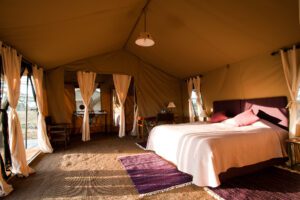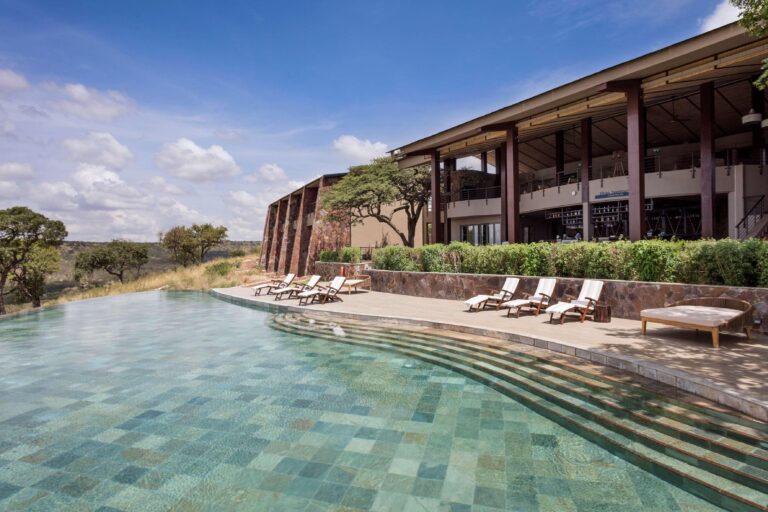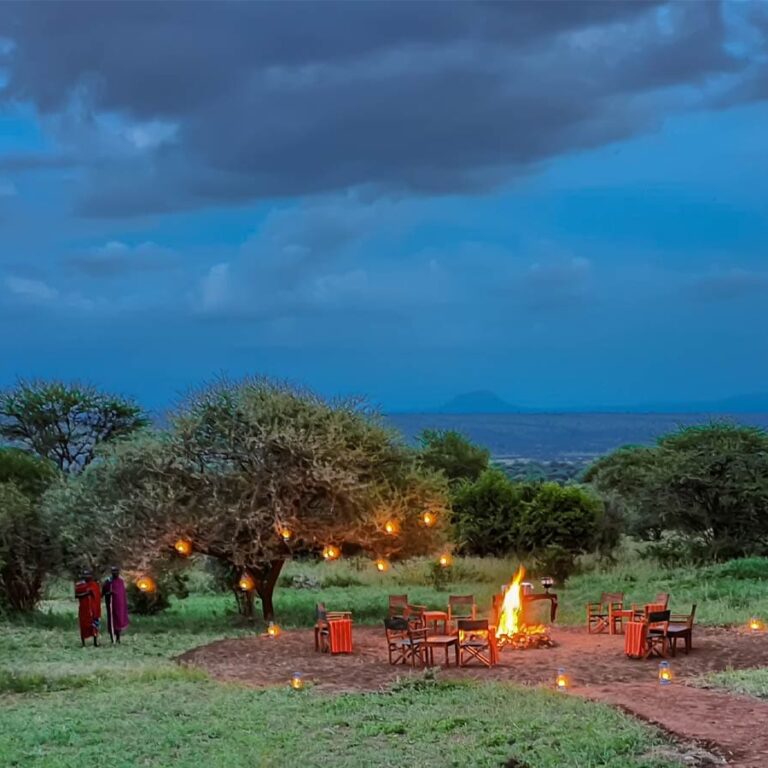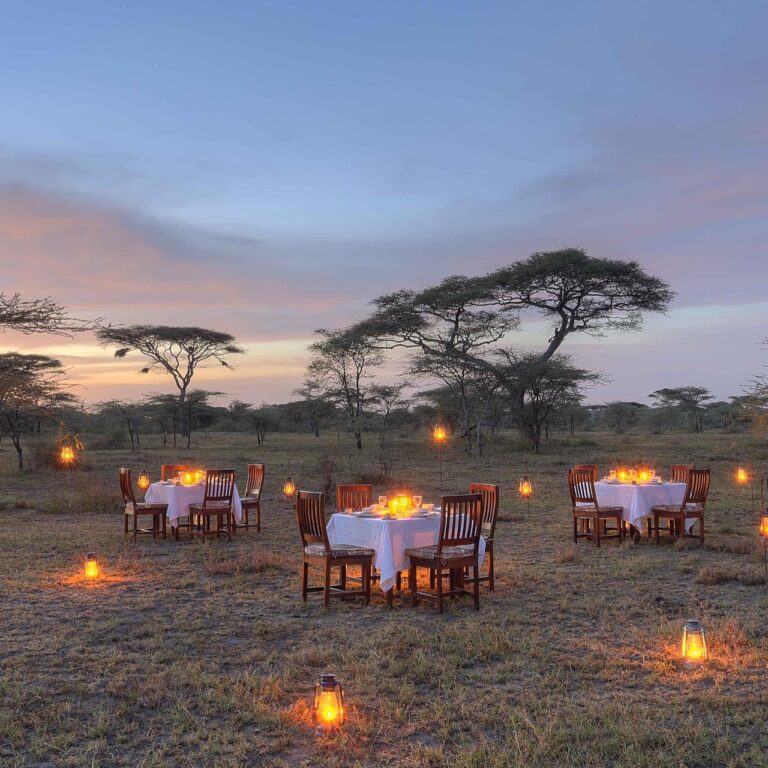Is Solo Travel on an African Safari Right for You? Yes!
Yes, solo travel on an African safari is a rewarding and increasingly popular experience, with many camps and lodges designed to welcome independent travelers. The extensive support from tour operators and guides ensures your safety, and shared game drives and communal dining create natural opportunities to bond with other guests. Making a solo trip is both sociable and a chance for personal reflection and adventure.
The image of an African safari is often one of a group: a family, a couple, or a band of friends sharing a moment of awe as a pride of lions rests in the shade. But what if you’re a solo traveler, drawn to the call of the wild and the promise of an unbridled adventure? The question often arises: Is a solo safari a good idea? The answer, unequivocally, is a resounding yes. A solo safari is not just possible; it can be one of the most transformative and deeply personal travel experiences you’ll ever have.
Breaking free from the constraints of group travel allows you to forge your path, set your own pace, and immerse yourself in the natural world in a way that’s truly your own. It’s an opportunity for introspection, self-discovery, and a unique connection with the landscapes and wildlife of Africa. Why a Solo Safari Can Be a Great Experience? Venturing into the African bush on your own might seem daunting, but it’s an adventure filled with unparalleled rewards. Here’s why a solo safari is an experience to be cherished:
1. Assured Safety and Expertise
Safety is a top priority for any traveler, and on a solo safari, you are in the best hands. Reputable safari operators and lodges prioritize the well-being of their guests above all else. You’ll be accompanied by an experienced and certified guide who is a walking encyclopedia of the local flora and fauna. These guides are not only experts in tracking wildlife but are also trained in safety protocols, ensuring you are secure at all times. They navigate the terrain, manage all logistics, and provide a buffer of expertise, allowing you to relax and fully absorb the magic of the moment. You are never truly “alone” in the wilderness; you are with a professional who is dedicated to your safety and enjoyment.
2. Personalized Adventure
One of the greatest benefits of traveling solo is the complete control you have over your itinerary. While you’ll be part of a group for game drives, the rest of your adventure is entirely yours. You can spend more time watching a particular animal, linger at a scenic viewpoint, or focus on a specific interest like bird watching or photography. Your guide can tailor the experience to your passions, creating a safari that feels custom-made for you. This personalization ensures that every moment aligns with what you want to get out of the trip, making it far more meaningful than a one-size-fits-all group tour.
3. Social Environment
Paradoxically, traveling solo on a safari doesn’t mean you’ll be lonely. Lodges and camps are designed to foster a communal atmosphere. Meals are often served at a communal table, where you can connect with fellow travelers from all over the world. Sharing stories of the day’s sightings over a campfire creates a natural camaraderie. You’ll meet people from different walks of life, all united by a shared passion for wildlife and adventure. The social environment is vibrant, welcoming, and provides the perfect balance between solitude and companionship.
4. Independence and Confidence
A solo safari is a powerful exercise in independence. It forces you to rely on yourself, make decisions, and step outside of your comfort zone. This experience can be incredibly empowering, building a sense of self-confidence and resilience that extends far beyond your trip. Navigating new cultures, adapting to different environments, and conquering any initial anxieties will leave you feeling accomplished and ready to take on the world.
5. Deep Wildlife Immersion
Without the distraction of a travel companion, you can fully tune into the sounds, sights, and smells of the African bush. You can sit in quiet contemplation, observing the subtle behaviors of the animals and the intricate dance of the ecosystem. The silence allows for a deeper connection with the wild, making every rustle in the grass and every distant roar feel more profound. This is where the true magic of a safari lies—in the quiet moments of communion with nature.
6. Fulfilling Your Dreams
Yes, you absolutely can and should consider a solo African safari for a highly rewarding and flexible travel experience, though it requires careful planning to ensure safety and to manage potential loneliness. Solo travel allows you to fully customize your itinerary to your interests and pace without needing to compromise with others, fostering independence and self-discovery. While safety concerns are common, professional planning provides secure logistics, expert guides, and a supportive environment, and you’ll find many opportunities to connect with like-minded people if you wish. Perhaps you’ve always dreamed of seeing the Great Migration or spotting a black rhino in the wild. A solo safari allows you to chase these dreams without compromise. You don’t have to negotiate with others about where to go or what to do. Your journey is a direct pursuit of your aspirations, making the fulfillment of these dreams all the more special.
7. Companionship—When You Want It
The beauty of a solo safari is its flexibility. Enjoy a peaceful evening alone with a book or join the communal table for dinner and lively conversation. You can go on a walking safari with a group or request a private moment for reflection. Control the level of social interaction, striking the perfect balance between solitude and connection. Traveling solo on an African safari offers unparalleled freedom and the opportunity for personal growth, deep immersion in nature, and meeting new people. Whether you prefer independent adventures or structured small group tours, solo travel allows for personalized experiences, and you can also find opportunities for companionship through lodges with communal dining or by joining tours with like-minded travelers.
How to Prepare for a Solo African Safari
To prepare for a solo African safari, choose a reputable tour operator for safety and convenience, share your itinerary and travel insurance details with loved ones, and consult a travel health professional for necessary vaccinations and health precautions. Pack lightweight, neutral-colored, layered clothing, sturdy walking shoes, sun protection, a good camera with a zoom lens, binoculars, a basic first-aid kit, and a reusable water bottle. Inform yourself about cultural sensitivities and wildlife safety guidelines for your destination. Proper preparation is key to a smooth and enjoyable solo safari. Here’s how to set yourself up for success:
Choose a Reputable Operator
This is the most critical step. A good safari operator will not only handle all logistics but also ensure your safety and comfort. Look for companies with excellent reviews, a strong track record, and specific experience catering to solo travelers. They will often have single-supplement waivers or special packages for individuals.
Book in Advance
Popular safari lodges and operators, especially those offering no single supplement, can fill up quickly. Booking several months in advance will secure your spot and often result in better deals. This is especially true for peak seasons like the Great Migration. Solo traveler spots can sometimes be limited, especially in smaller, more intimate camps. Booking well in advance—6 to 12 months out—ensures you get your preferred dates and accommodations, and can often secure a better price.
Consider Private Options
A solo safari often benefits from a private guide and vehicle. This gives you the flexibility to go where you want, when you want, without compromising on safety. It’s a more personalized and immersive experience. Consider traveling solo on an African safari, as it offers ultimate flexibility and opportunities to connect with like-minded people, though it can be more expensive due to single supplements. Professional planning ensures safety, and many tour operators pair solo travelers to avoid these costs, making it a rewarding experience whether you’re an experienced or first-time solo adventurer.
Stay Connected
Inform your family or friends of your itinerary, including flight details and camp names. While you may want to disconnect from the digital world, having a reliable means of communication for emergencies (e.g., a satellite phone or Wi-Fi access at camp) is a wise precaution.
Be Aware of Your Surroundings
You can travel solo on an African safari, but preparation and awareness are crucial for safety and success. While professional planning by tour operators makes solo safaris safe, self-guided safaris require significant experience in the bush and motor mechanics. Key safety measures include researching destinations and advisories, respecting wildlife and local culture, avoiding nighttime travel and displays of wealth, and staying informed about local crime and safety concerns. This applies to all travel but is especially important for solo adventurers. Listen to your guides, follow all safety instructions, and be mindful of your personal belongings. The safari environment is incredibly safe, but common-sense precautions are always a good idea.
Pack Smart
Consider a solo African safari; they are a safe and rewarding experience for solo travelers thanks to professional planning and guidance. To pack smart for a solo safari, focus on light, quick-drying, and comfortable clothing in neutral, non-flashy colors like khaki or beige, and include layers for warm evenings, closed-toe shoes, sun protection, and basic first-aid supplies. Pack light but efficiently. Neutral-colored clothing is essential for game drives. Don’t forget essentials like a good pair of binoculars, a camera with extra batteries, a sun hat, sunscreen, insect repellent, and any personal medications. Layers are your best friend, as temperatures can fluctuate throughout the day.
Choosing the Right Accommodation
Research camps and lodges that are known for their welcoming atmosphere. Many safari camps, especially smaller, luxury ones, are designed to make solo travelers feel at home. Look for places with communal dining areas and a focus on guest interaction. How to Choose the Right Accommodation for a Solo Safari? Yes, you should consider traveling solo on an African safari; lodges and tour operators frequently cater to solo travelers, offering shared activities like game drives and meals to foster connection while also allowing for privacy. When choosing accommodation, look for lodges that offer communal spaces, such as shared meals and excursions, to meet others, but also ensure strong security and staff availability. Consider destinations like Tanzania, and don’t hesitate to work with a travel professional to find the right fit and avoid high single supplement costs.
Navigating Transportation Logistics
Traveling solo on an African safari is possible and rewarding, but it requires careful planning, especially for transportation, and a budget that accounts for potential single supplements and private transfers, which can be costly. For most first-time solo travelers, joining scheduled group tours for solo adventurers is recommended for affordability, safety, and seamless logistics, while experienced travelers with bushcraft and navigational skills may consider private individual custom adventures in certain locations, such as Serengeti National Park in East Africa, which offers more accessible infrastructure. Reputable safari operators will handle all your transport needs, from airport transfers to internal flights and game drive vehicles. This removes the stress of navigating a foreign country alone and ensures a seamless journey.
Cultural Immersion Opportunities
Engage in African safaris for single seniors with the local culture. Many safaris offer opportunities to visit local villages, markets, or schools. Taking part in these activities enriches your trip and provides a deeper understanding of the destination. Solo travel can offer deeper cultural immersion on an African safari by fostering authentic connections with local communities and providing unique opportunities for self-discovery through shared experiences and solitude. Countries like Tanzania are excellent for luxury African safari solo travelers due to their well-developed infrastructure and diverse wildlife. Offerings range from luxury lodges and wildlife encounters to cultural tours and thrilling activities like gorilla trekking. While solo travel can present unique challenges like finding local guides without established infrastructure. The potential for meaningful interactions, self-reflection, and a profound connection with nature makes it a highly rewarding experience.
Navigating Language and Communication
English is widely spoken in tourist areas across many African safari destinations. Your guides will be fluent, so communication is rarely an issue. Learning a few basic phrases in the local language (e.g., Swahili in Tanzania) can be a fun and respectful way to connect with people. Note: For private Tanzanian tours tailored to solo travelers in their 30s and 40s, focus on companies like Flash Pack, which offers group tours specifically for this demographic, or customize a private safari through a platform like Foot Slopes Tours and Safaris or by working with a specialized agency like Foot Slopes Tours and Safaris African Safaris. Look for private tours that combine classic Northern Circuit highlights like the Serengeti and Ngorongoro Crater with unique cultural experiences, such as the Mto wa Mbu village or a stay on Zanzibar.
Popular Solo-Friendly African Safari Destinations
Popular solo-friendly African safari destinations include Tanzania’s Serengeti, Tarangire. Lake Manyara, and Ngorongoro Crater for wildlife viewing, and Mount Kilimanjaro for adventurers, along with the beach relaxation of Zanzibar. You can also consider the Hadzabe and Datoga tribes at Lake Eyasi for cultural immersion and the Arusha National Park for diverse landscapes and wildlife. Southern Tanzania is also a social option, with communal dining and flexibility for solo travelers. East Africa, particularly Tanzania, is an ideal destination for solo travelers due to its well-established safari infrastructure and reputation for safety and hospitality. Here are some of the top picks:
Serengeti National Park. The Serengeti is a Luxury African safari destination for singles, the quintessential safari destination, famous for the Great Migration. Its vast plains and abundant wildlife make it a stunning place to explore. The large number of camps and lodges means there are plenty of options, including those well-suited for solo visitors.
Ngorongoro Crater. This UNESCO World Heritage site is a breathtaking caldera teeming with wildlife. It’s a compact area with a high density of animals. Making it perfect for a concentrated wildlife viewing experience. The lodges on the rim offer spectacular views and a luxurious base for exploration.
Tarangire National Park. Known for its massive elephant herds and iconic baobab trees. Offers Safari holidays for solo travelers a more rugged and authentic safari feel. It’s a great place for photographers and those who want to see a different side of the Tanzanian bush.
Lake Manyara National Park. Famed for its tree-climbing lions and a diverse ecosystem that includes a large soda lake, it is a beautiful and varied park. It’s an excellent stop on a Northern Circuit itinerary.
Arusha National Park. Often a starting point for safaris, Arusha National Park is a smaller gem with diverse landscapes, from montane forest to the tranquil Momella Lakes. It’s a great spot for walking safaris and canoeing, which provide a different perspective from game drives.
Mount Kilimanjaro. While not a traditional safari, climbing Africa’s highest peak is an ultimate solo adventure. Guided climbs are highly organized, and you’ll be part of a team. Making it a safe and social, yet deeply personal, challenge.
Zanzibar. For a post-safari retreat, the spice island of Zanzibar offers stunning beaches and a rich cultural history. It’s a perfect place to relax, reflect, and enjoy the beautiful Indian Ocean.
Lake Eyasi. For unique recommendations for a solo African Safari cultural experience, a visit to Lake Eyasi allows you to interact with the Hadzabe. One of the last remaining hunter-gatherer tribes in Africa. This is a profound and humbling experience that is even more impactful when you are open to the learning that solitude brings.
What are the main benefits of solo travel on an African Safari?
The main benefits of solo travel on an African safari are complete itinerary control. Enabling a trip tailored to individual interests and pace. Enhanced personal growth, fostering confidence and self-reliance; unparalleled opportunities for connection. From bonding with fellow travelers over shared meals to engaging deeply with local culture. A unique way to experience nature, either through peaceful solitude or shared discovery.
Is solo travel safe in Africa?
Yes, solo travel can be safe in Africa with proper planning and precautions. But safety levels vary significantly by country and region, and are generally higher in stable, tourist-friendly nations like Tanzania. While general safety tips like avoiding nighttime travel, staying alert to your surroundings, and being mindful of valuables apply. It’s crucial to research specific destinations, stick to tourist-friendly areas. Use reputable transportation like Uber over public buses, and be prepared for potential scams.
What is the best time of year to visit Africa on a solo safari?
The best time for a solo African safari depends on your priorities. But June to October is generally excellent for wildlife viewing due to the dry season, when animals gather at water sources, making them easier to spot. For fewer crowds, lower costs, and pristine landscapes, consider the “green season” or shoulder months like late October to April. Which offer lush scenery, great birdwatching, and special events like calving season.
What to expect on a Travel Solo on an African Safari?
On a solo African safari, expect an adventure tailored to your independent spirit, offering flexibility to explore at your own pace. But also requires careful planning for increased costs like single supplements and potential safety considerations. You’ll connect with nature and potentially other travelers during activities like game drives. While enjoying moments of solitude for personal discovery. Be prepared for unpredictable encounters. Embrace new experiences, and pack appropriate gear for the wilderness.
Is solo travel on an African Safari right for you?
Solo travel on an African safari can be a perfect choice for you if you enjoy wildlife, personal growth, new friendships, and a rewarding journey of self-discovery, especially when using a tailor-made itinerary handled by a trusted travel advisor. It offers flexibility, opportunities to connect with like-minded people, and a chance to gain confidence by relying on yourself in an unfamiliar environment.
What is the ultimate guide to traveling solo on an African Safari?
To plan a successful solo African safari, choose a reputable tour operator for safety and logistics, select the right season for your preferences, and pack light, neutral-colored clothing, and essential gear like binoculars and a camera. Prioritize safety by following the guides’ instructions, staying connected with loved ones, and having travel insurance. Embrace the opportunity for self-discovery while appreciating the wildlife and the joy of quiet reflection.
Why Safaris are great for Solo Travelers?
Safaris are excellent for solo travelers because they offer safety through organized logistics. Foster social connections with guides and other guests, and providing a solo safari in Africa might be the best trip of your life opportunities for deep personal growth and self-reliance in a secure, structured environment. The unique nature of a safari provides the flexibility to customize an itinerary to individual interests. A solo Traveler’s Guide to an African Safari ensures all aspects of travel. Such as transfers and meals, are handled, allowing for focus on immersion in nature.
Can You Climb Kilimanjaro Solo?
What to Expect on a Solo Safari in East Africa
A Solo Traveller’s Guide to Tanzania
A Beginner’s Guide to African Safaris for Solo Travellers
11-Day Tanzania Safari for solo travelers
In conclusion
Traveling solo on an African safari is not just possible—it’s an opportunity for a profound and deeply personal adventure. It’s a chance to connect with nature on your terms, challenge yourself, and create memories that are uniquely yours. With the right planning and a reputable operator. Your solo safari will not only be safe but also one of the most fulfilling journeys of your life.








